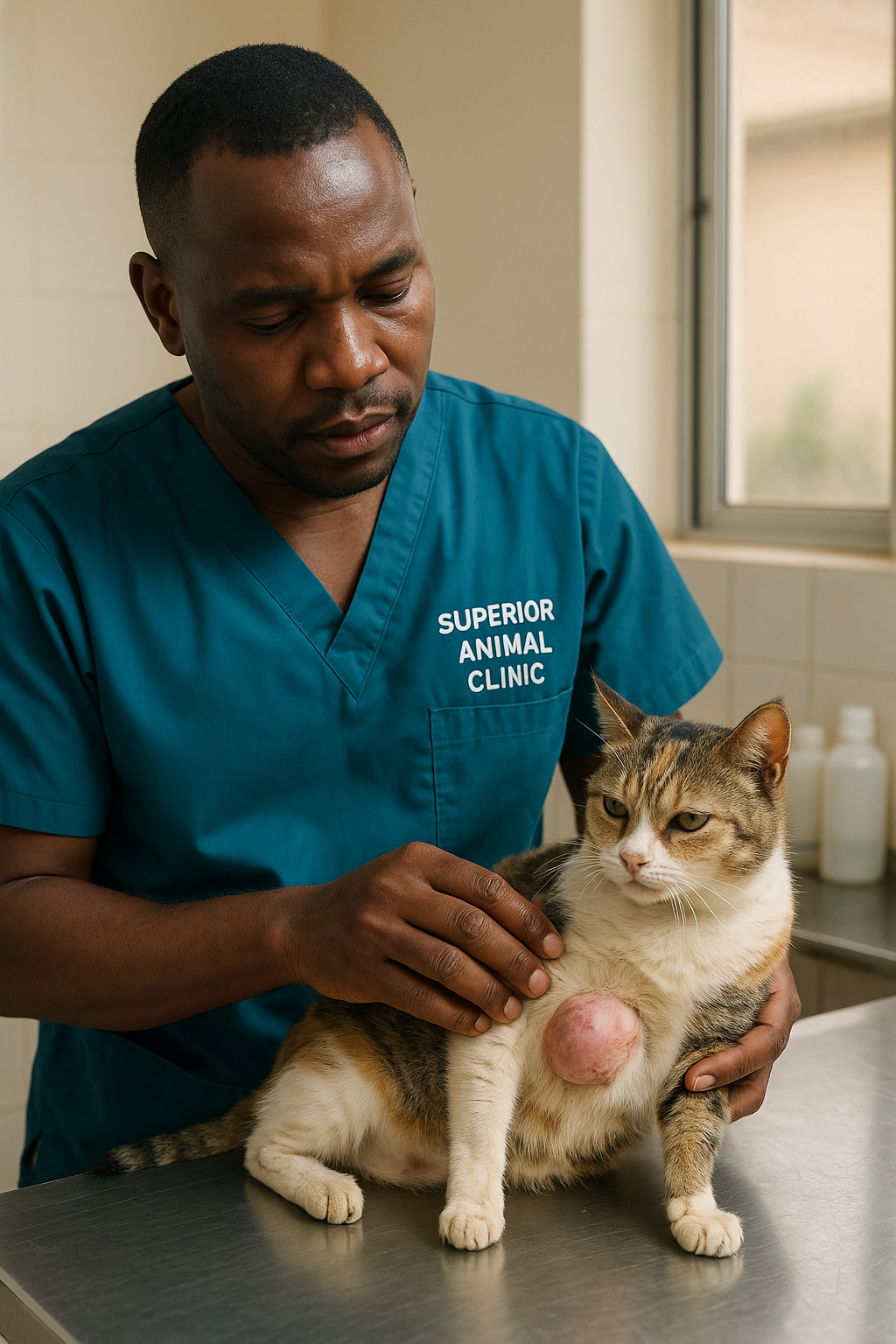
(Written especially for cat parents across Ntinda, Old Kampala, Lungujja, Kasubi, Nsambya, Katwe, Zana, Nakasero, Makindye, Buziga, Munyonyo, Mityana, Nakawa, Rubaga, Muyenga, Naguru, Bugolobi, Kabowa, Kabojja, Lugogo, Lubowa, Seguku, Ndejje, Kololo, Mutundwe, Bukoto, Bulindo, Kulambiro and all around Kampala)
When Your Cat’s Purr Suddenly Fades
It usually starts quietly.
One morning, Sarah from Muyenga noticed that her beloved cat, Milo, wasn’t his usual playful self. He wasn’t chasing his toy mouse, wasn’t eating much, and seemed to spend more time hiding under the bed. At first, she thought it was just the weather or maybe a stomach upset. But a few days later, she felt a small lump under his neck — and panic set in.
Just like Sarah, many cat parents in Kampala, from Ntinda to Makindye, Bugolobi to Rubaga, often face this moment of fear — “Could my cat have cancer?”
If you’ve ever found a strange lump, noticed unexplained weight loss, or your cat has stopped grooming, you’re not alone. At Superior Animal Clinic along Salaama Road, Makindye, we meet loving cat owners every week who come in worried, asking:
“Doctor, my cat isn’t eating… could it be cancer?”
“Is there a vet near me in Kampala who treats cat tumours?”
“How much does cat cancer treatment cost in Uganda?”
We understand how heartbreaking it is to imagine your cat sick. The good news? Many cat cancers can be treated successfully — especially when caught early.
In this article, we’ll walk you through everything you need to know about cat cancer in Uganda — from the most common types, causes, and warning signs, to how we diagnose, treat, and support cats battling cancer here at Superior Animal Clinic. You’ll also learn about prevention, costs, prognosis, and home-care tips that every cat owner in Kampala should know.
So grab a cup of tea, call your cat over (if she’s not hiding!), and let’s talk about how to give your feline friend the healthiest, happiest life possible — even after a scary diagnosis.
Why every cat-owner in Kampala should treat suspected cancer urgently
Cancer in cats is serious. If your cat is hiding, not eating, has lumps, or seems off its usual self, it’s tempting to wait—but delaying can allow the cancer to progress. Early detection and treatment improve outcomes (and quality of life) significantly.
Because in busy areas like Ntinda, Kasubi, Lubowa, Bugolobi, and Nakasero where many cats live both indoors and outdoors, exposure to risk factors is real. Your cat doesn’t have the voice to tell you “I’m not well” the way we’d like, so as a loving cat-parent you must act swiftly.
At Superior Animal Clinic, we emphasise: “If you’ve typed ‘cat cancer vet Kampala’, come see us right away”. The sooner we diagnose, the better chance your cat has.
What types of cancer do cats in Uganda commonly get?
Imagine running your hand through your cat’s soft fur one evening — and suddenly feeling a small lump under the skin. Your heart skips a beat. Is it serious? Could it be cancer?
At Superior Animal Clinic here in Makindye, we often meet cat owners in Kampala who bring in their cats after noticing a strange swelling or a change in behaviour. Many are shocked to learn that, yes — cats can and do get cancer, just like humans.
Let’s break down the most common types of cancers in cats found in Uganda, their signs, and what you as a caring cat owner should watch out for 👇
🩸 1. Lymphoma (Cancer of the Lymph Nodes or Blood System)
This is the most common type of cancer in cats we see across Kampala. It affects the lymphatic system — the part of the body that helps fight infections.
- Where it appears: Lymph nodes, intestines, liver, or even chest.
- Signs you may notice:
- Swollen lymph nodes (under the chin or neck)
- Weight loss
- Poor appetite
- Trouble breathing (if in the chest)
- Diarrhoea or vomiting (if in the intestines)
- Swollen lymph nodes (under the chin or neck)
- Who’s at risk: Cats exposed to Feline Leukemia Virus (FeLV) or Feline Immunodeficiency Virus (FIV) — especially outdoor or stray cats around Old Kampala, Katwe, Nsambya, and Lungujja.
At Superior Animal Clinic, we diagnose lymphoma using blood tests, fine needle aspiration, and imaging, then discuss treatment options such as chemotherapy or supportive therapy.
🐾 2. Mammary Gland (Breast) Cancer
This is the second most common cancer in cats — mostly affecting unspayed females.
- Where it appears: Along the belly, near the nipples.
- What you’ll see: Small firm lumps or sores that may ooze or ulcerate over time.
- Who’s most affected: Female cats that have never been spayed or were spayed late.
👉 Tip: Spaying your cat before her first heat (around 5–6 months) reduces her risk of breast cancer by up to 90%!
At Superior Animal Clinic, we usually recommend surgical removal of the affected glands and testing to see if the cancer has spread. We also offer pain management and post-surgery care to ensure a smooth recovery.
😾 3. Squamous Cell Carcinoma (Skin and Mouth Cancer)
This cancer affects the skin and mucous membranes — often caused by sun exposure or chronic inflammation.
- Where it appears: On the ears, nose, eyelids, or inside the mouth.
- Signs to look for:
- Scabs or sores that don’t heal
- Drooling or bad breath (if in the mouth)
- White or red patches on the gums or tongue
- Scabs or sores that don’t heal
- Cats at risk: Light-coloured cats living in sunny suburbs like Bugolobi, Muyenga, and Kololo.
Treatment may include surgery to remove the affected tissue and, in advanced cases, pain management and palliative care. Early detection saves lives — so if you notice a sore that doesn’t heal, bring your cat in right away.
4. Fibrosarcoma (Soft-Tissue Tumour)
Fibrosarcomas grow in the connective tissues beneath the skin, usually as a firm lump that slowly enlarges.
- Where it appears: Back, limbs, or injection sites.
- What you’ll notice:
- A hard lump under the skin that keeps growing
- No pain at first, but may become sore over time
- A hard lump under the skin that keeps growing
- Who’s at risk: Any cat, but especially older ones.
At Superior Animal Clinic, we perform biopsies and imaging to confirm the diagnosis and then remove the tumour surgically with a safety margin to prevent recurrence.
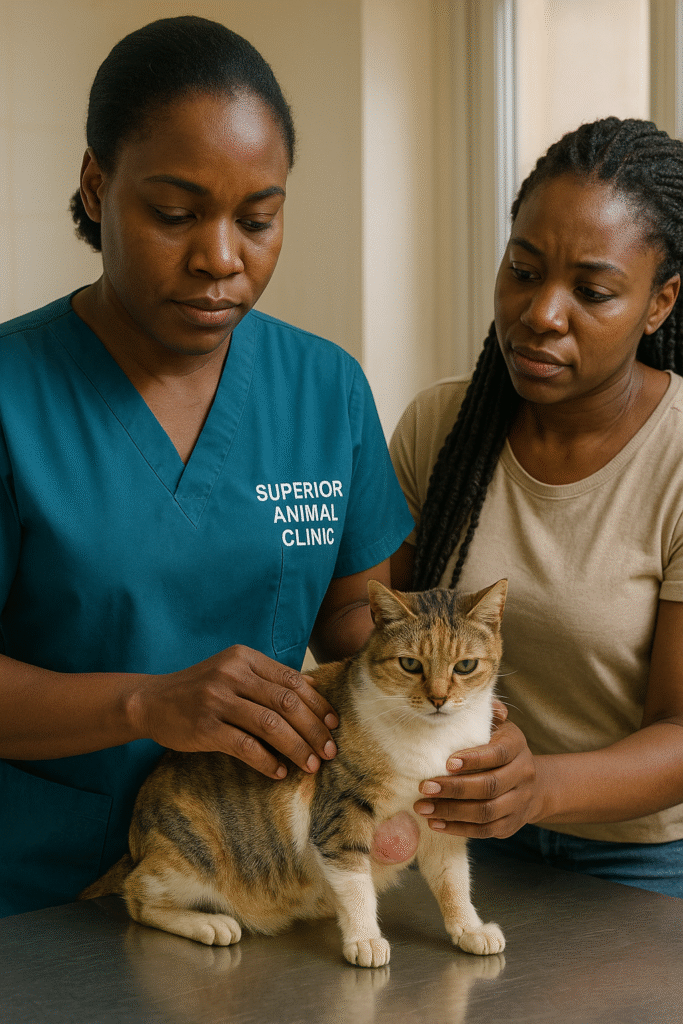
5. Brain or Neurological Tumours
Although rare, these can occur in older cats and cause sudden changes in behaviour or movement.
- Signs include:
- Seizures
- Head tilting
- Walking in circles
- Sudden blindness or confusion
- Seizures
If your cat in Makindye, Rubaga, or Ndejje starts acting disoriented or has fits, don’t ignore it — bring them for evaluation. At our clinic, we perform neurological exams and imaging to guide treatment and supportive care.
6. Bone and Joint Tumours
These are uncommon but very painful cancers that affect the limbs.
- You may notice:
- Persistent lameness or limping
- Swelling on one leg
- Crying or hiding due to pain
- Persistent lameness or limping
Our team at Superior Animal Clinic provides pain relief, diagnostics, and surgical treatment where possible to improve comfort and mobility.
🌸 Summary: Most Common Cat Cancers We Treat in Uganda
| Type of Cancer | Main Signs | Best Treatment Options (at Superior Animal Clinic) |
| Lymphoma | Swollen lymph nodes, weight loss, breathing problems | Chemotherapy, supportive care |
| Mammary gland | Lumps near nipples, ulcerated sores | Surgical removal, early spay prevention |
| Squamous cell carcinoma | Skin sores, mouth lesions | Surgery, pain management |
| Fibrosarcoma | Growing lump under skin | Surgical excision, biopsy |
| Brain tumour | Seizures, confusion | Imaging, supportive therapy |
| Bone tumour | Limping, swelling, pain | Surgery, pain management |
A quick word from our vet team
“The earlier we diagnose cancer, the better the outcome. Don’t wait to see if a lump disappears — come in for a quick check-up. In many cases, early surgery or treatment gives your cat a second chance at life.”
— Dr. Ronnie, Superior Animal Clinic, Makindye
Common Causes of Cancer in Cats in Kampala, Uganda
Many cat owners in Kampala — from Makindye, Muyenga, and Ntinda, to Bugolobi, Rubaga, and Luzira — often ask us at Superior Animal Clinic,
“Doctor, how did my cat get cancer?”
It’s a question filled with emotion and confusion — and one we take time to answer carefully, because cat cancer doesn’t come from just one cause. It’s usually a mix of genetics, lifestyle, environment, and even infections.
Let’s break it down together 👇
1. Genetics and Breed Predisposition
Just like people, some cats are simply born with a higher risk.
Purebred cats like Siamese, Persians, and Maine Coons are more likely to develop cancers such as mammary tumors or lymphoma.
If your cat is one of these breeds — or comes from a known bloodline — regular vet checkups can literally save their life.
💡 Tip: Book a wellness exam every 6–12 months at Superior Animal Clinic, Makindye, even if your cat looks healthy. Early detection makes a huge difference.
2. Sunlight and Skin Exposure
Cats that love basking in the sun — especially white or light-colored ones — can develop skin cancer (squamous cell carcinoma) on the ears, nose, or eyelids.
This is more common in sunny areas like Buziga, Munyonyo, and Lubowa, where cats spend long hours outdoors.
🐾 Try this: Provide shaded resting spots or use pet-safe sunscreen for light-coated cats that go outside often.
3. Viral Infections (Feline Leukemia Virus – FeLV & FIV)
Two major viruses, FeLV and FIV, are strongly linked to cancer in cats — especially lymphoma.
These viruses weaken the immune system and allow abnormal cells to grow uncontrollably.
Unvaccinated cats, strays, or those living in multi-cat environments (like in Katwe, Kasubi, or Kawempe) are more at risk.
💉 Good news: Vaccination and early testing at Superior Animal Clinic can prevent most FeLV-related cancers.
4. Environmental Toxins
Cats are small but curious explorers — and their bodies absorb toxins faster than ours.
Exposure to cigarette smoke, household cleaning chemicals, pesticides, or old paints can trigger cell changes leading to tumors.
This is especially common for indoor cats in apartment settings in Nakasero, Kololo, and Naguru, where ventilation is limited.
🌿 Home safety tip: Always use pet-safe detergents and avoid spraying insecticides where your cat sleeps or eats.
5. Diet and Obesity
Obesity increases inflammation and hormonal changes that make the body more prone to cancer, especially mammary gland tumors.
Feeding too many table scraps or cheap cat food high in fillers can add to the risk.
🥦 Vet tip: Stick to a balanced, high-protein diet — and ask our vets in Makindye about the best local brands for cancer prevention.
6. Chronic Inflammation or Injury
Repeated irritation — like from old wounds, infections, or dental abscesses — can sometimes trigger cancerous growth over time.
We often see this in cats with untreated mouth sores, eye infections, or chronic ear problems.
Solution: Treat small issues early. Don’t wait for them to “heal on their own.”
❤️ Final Takeaway
Cancer in cats isn’t caused by just one thing — it’s the result of many small factors adding up over time. But here’s the hopeful truth:
Most of these causes can be managed, reduced, or prevented with proper vet care, vaccination, and nutrition.
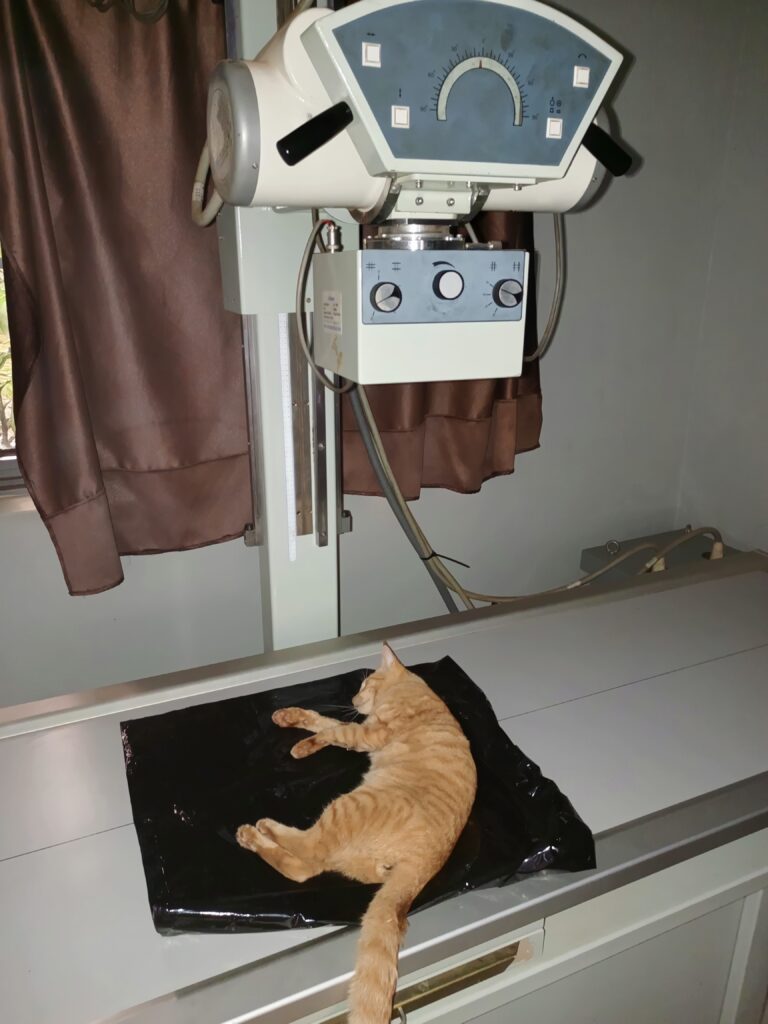
How do you know if your cat might have cancer? What signs should you look out for?
Cancer in cats can be sneaky — it often starts quietly, with signs that are easy to miss. Many cat parents in Kampala — from Makindye and Muyenga, to Ntinda, Bugolobi, and Rubaga — tell us,
“Doctor, I didn’t think it was serious at first. My cat just seemed a little tired.”
That’s completely understandable. Cats are masters at hiding pain or discomfort. But knowing what to watch for could save your cat’s life. At Superior Animal Clinic, we always say:
💬 “If something feels off, it’s better to check early — not late.”
Let’s go over the most common warning signs of cancer in cats, and what each could mean.
1. Unexplained Lumps or Swellings
If you feel a lump under your cat’s skin — especially on the neck, belly, or limbs — it’s worth getting it checked.
Not all lumps are cancer, but fast-growing or firm lumps that don’t go away need attention.
We often see this with mammary gland tumors (especially in unspayed females) and lymphomas near the neck.
👉 Tip: Try gently checking your cat once a month when petting — especially around the belly and under the arms.
2. Loss of Appetite or Sudden Weight Loss
When a cat in Kampala stops eating well or starts losing weight quickly, it’s a red flag.
Cancers of the stomach, liver, or intestines can make cats nauseated or unable to digest food properly.
At Superior Animal Clinic, we often perform quick blood tests and ultrasound scans to see what’s happening inside.
🐾 If your cat skips meals for more than 24–48 hours — come in for a checkup.
3. Increased Thirst or Urination
Some cancers (especially those affecting the kidneys or endocrine glands) cause cats to drink or urinate more.
If your cat’s litter box or sleeping spot seems wetter than usual — or if they start urinating outside the box — it’s time to investigate.
💡 In areas like Ntinda and Bugolobi, where the heat can also make cats thirsty, always compare their drinking habits to what’s normal for your cat.
4. Lethargy or Loss of Energy
When playful cats suddenly lose interest in toys, naps become longer, or they seem “down,” it could signal something deeper.
Cancer drains the body’s energy as it grows — making cats weak and tired.
At our Makindye clinic, we’ve seen even quiet cats perk up after treatment once the underlying illness is addressed.
5. Mouth Odor, Drooling, or Difficulty Eating
Oral cancers are surprisingly common in cats around Kampala, especially in older ones.
If your cat is drooling, has foul breath, or seems to chew on one side of the mouth, don’t assume it’s just dental disease.
Tumors can grow in the gums or under the tongue and cause these signs.
🩺 A quick oral exam by our vets at Superior Animal Clinic can catch this early — before it spreads.
6. Unusual Bleeding or Discharge
Bleeding from the mouth, nose, or rectum, or any unusual vaginal discharge in females, may be linked to internal cancers.
These are often seen in mammary, nasal, or intestinal tumors.
Never ignore blood spots on bedding or when cleaning your cat — they’re small clues that can reveal big problems early.
7. Lameness or Swelling in the Legs
When a cat limps without injury or shows swelling in the limbs or jaw, bone cancer could be the culprit.
Though rare, it’s aggressive and painful — but early vet intervention can relieve pain and extend quality of life.
🐾 We often provide pain management and biopsy options at Superior Animal Clinic to confirm and manage such cases.
8. Behavioral or Personality Changes
Cats with brain or systemic cancers may suddenly become aggressive, hide more, or act confused.
Some may stop using the litter box or seem “distant.”
If you live in a busy area like Katwe, Kasubi, or Kabalagala, remember — it’s not always stress from noise. Sometimes it’s medical.
Trust your gut — you know your cat best.
9. Persistent Vomiting or Diarrhea
Cancers in the digestive tract can cause chronic stomach upset that doesn’t respond to normal treatment.
If your cat vomits frequently, has ongoing diarrhea, or you see blood in stool, come for a full checkup.
🧪 We can run fecal exams, x-rays, and ultrasounds right here in Makindye to find the cause quickly.
The Takeaway
If your cat shows two or more of these symptoms — even mild ones — don’t wait.
Bring them to Superior Animal Clinic, Makindye, where we’ll perform gentle tests to find out what’s going on.
Early diagnosis means:
- Less pain for your cat 🐱
- Lower treatment costs 💰
- And a much higher chance of recovery ❤️
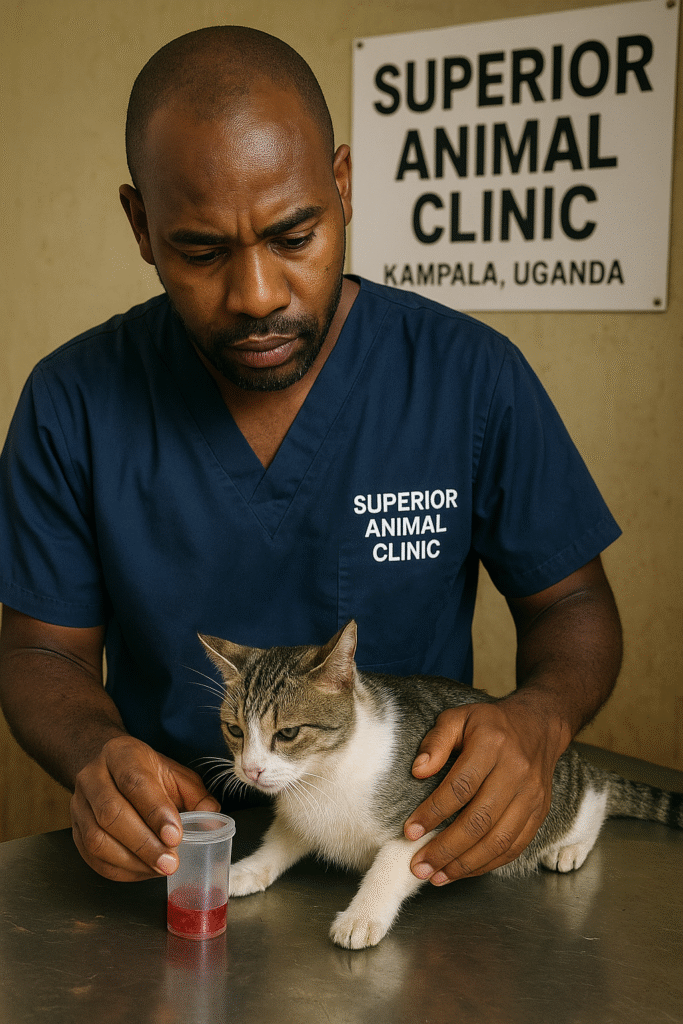
What is the prognosis if you don’t treat cat cancer?
Without treatment, many cat cancers will progress: tumours grow, may spread (metastasise), cause organ failure, weight loss, pain, and eventually poor quality of life or death. At that stage treatment becomes more difficult, more costly, and outcome worse.
By choosing early treatment at Superior Animal Clinic, your cat has a much better chance of a longer, more comfortable life.
What’s the process of cancer treatment in Uganda at Superior Animal Clinic
Here’s how we handle cat cancer step-by-step in our clinic:
- Initial consultation & physical exam
You bring your cat to our Makindye facility (Salaama Road). We ask about symptoms, history, lifestyle (indoors/outdoors, diet, exposure), check the cat thoroughly for lumps, organs, lymph nodes, general health.
- Diagnostic tests
- We may perform blood tests (CBC, biochemistry) to assess general health and organ function.
- We may do cytology/biopsy of the lump (we remove a small sample) to see what type of tumour.
- Imaging (X-ray or ultrasound) to check for internal spread if needed.
- Sometimes advanced diagnostics if required.
- We may perform blood tests (CBC, biochemistry) to assess general health and organ function.
- Staging & treatment planning
After diagnosis we determine: is the tumour benign or malignant? Has it spread? What is the best treatment plan? We present options (surgery, chemotherapy, supportive care) and estimated cost/time.
- Treatment
- Surgery: If the tumour is localised, we may surgically remove it.
- Chemotherapy/medication: For certain types of cat cancer we may use chemotherapy agents (depending on availability) and supportive medications (pain relief, nutritional support).
- Radiation therapy: This is seldom available locally for cats; we may refer or discuss alternatives.
- Supportive care: Good diet, pain management, monitoring, follow-up visits.
- Surgery: If the tumour is localised, we may surgically remove it.
- Follow-up and monitoring
Regular visits to monitor recovery, detect any recurrence, adjust medications, blood tests, imaging as needed. Your cat’s lifestyle, health and comfort are managed throughout.
- Communication & Owner education
We guide you on how to care for your cat at home, what to watch for, how to feed and support them, when to bring them back for check-ups.
Because we specialise in cat care (not just general, but cats in Kampala) we’re confident in providing one of the best treatments available in the city.
How much does cat cancer treatment cost in Uganda at Superior Animal Clinic (Kampala)
Cost varies a lot depending on the type of cancer, diagnostics required, surgery/chemo needed, follow-up, etc. For example, in Uganda, the cost of removing tumors or cancer in pets ranges from UGX 250,000 to 650,000 or more, depending on the complexity. Superior Animal Clinic. At our clinic, we provide an estimate after diagnosis and work with you on options.
We understand pet owners in Nakawa, Rubaga, Bukoto, Bulindo, Kulambiro all want transparency — we provide that.
Are there home remedies or natural herbs in Uganda for cat cancer?
It’s natural to search “natural herbs cat cancer Uganda” or “home remedies for cat tumour Uganda” — but we must be very clear: there is no proven herbal cure for cat cancer. Some herbs may support general health, appetite, or the immune system, but they do not replace professional veterinary treatment. Using only home remedies and delaying vet care risks your cat’s life. If you are using herbs, please discuss them with your vet (so they won’t interfere with medications, cause harm, or give false hope).
Can you prevent cancer in cats in Uganda? What are the best ways?
Preventing cancer in cats might sound complicated, but it really starts with daily care, smart choices, and regular vet visits. Just like people, cats living in Uganda can develop cancer due to a mix of genetics, lifestyle, environment, and infections.
The good news? You can dramatically lower your cat’s risk with the right preventive measures — and most of them are easy to do at home.
Let’s walk through how you can protect your cat from cancer, step by step 👇
🩺 1. Schedule Regular Veterinary Check-Ups
Early detection is the most powerful form of prevention.
At Superior Animal Clinic (Salaama Road, Makindye), we recommend a full-body check-up for your cat at least twice a year, especially if your cat is above 6 years old.
During these visits, we:
- Examine for any unusual lumps, bumps, or weight changes
- Run basic blood and organ tests
- Check for viruses that can lead to cancer (like Feline Leukemia Virus — FeLV)
Most cat owners in Ntinda, Bugolobi, or Lubowa only visit the vet when something is visibly wrong — but by then, it might be late. Regular check-ups help us catch changes early, when treatment is easiest and cheapest.
2. Spay or Neuter Your Cat Early
Did you know that unspayed female cats have a higher risk of mammary gland (breast) cancer?
Spaying your cat before her first heat cycle can almost eliminate this risk.
At Superior Animal Clinic, our team performs safe, affordable, and professional spay/neuter surgeries for cats across Kampala, including Munyonyo, Nakawa, Kololo, and Mutundwe.
Neutering male cats also helps prevent testicular and prostate-related cancers, and reduces aggressive behavior and roaming.
💡 Pro tip: If you’ve adopted a stray cat or kitten, book a spay/neuter appointment right after vaccination.
3. Protect Your Cat from Excessive Sunlight
Uganda’s strong equatorial sun can be harmful — especially for light-colored or hairless cats.
Too much sunlight can cause skin cancer, especially on the ears, nose, and eyelids.
Here’s how to protect your cat:
- Keep your cat indoors during the hottest hours (10 AM – 4 PM)
- Use UV-protective pet sunscreen on exposed areas (ask your vet for safe brands)
- Provide shaded outdoor spots if your cat likes sitting in the sun
If you notice redness, sores, or scaly patches on your cat’s ears or face, have them checked immediately at Superior Animal Clinic — early treatment makes all the difference.
4. Feed a Healthy, Balanced Diet
Your cat’s diet directly affects immune strength.
In Kampala, many cats eat leftover human food or cheap feeds that lack essential nutrients — which can weaken their body’s natural defense against disease.
We recommend:
- A balanced diet with protein-rich foods (chicken, fish, eggs)
- Taurine supplements for heart and eye health
- Omega-3 fatty acids for immune support and anti-inflammation
- Plenty of clean water to flush toxins
You can consult our vets at Superior Animal Clinic for a personalized feeding plan depending on your cat’s age, breed, and health condition.
5. Keep Your Cat Indoors or Supervised Outdoors
Cats that roam freely through Kasubi, Lungujja, or Katwe are exposed to:
- Viruses that cause cancer (like FeLV and FIV)
- Toxic chemicals or insecticides
- Car accidents and injuries
- Fights with other cats that transmit infections
Indoor cats live longer, healthier lives — and have a much lower cancer risk.
If your cat enjoys the outdoors, build a safe enclosed play area (catio) or use a harness leash for supervised exploration.
6. Vaccinate Against Cancer-Causing Viruses
Some viruses in Uganda directly cause or increase cancer risk in cats — especially Feline Leukemia Virus (FeLV) and Feline Immunodeficiency Virus (FIV).
Vaccines for FeLV are available and effective.
At Superior Animal Clinic, we test your cat first, then vaccinate safely and affordably.
Regular vaccination:
- Strengthens your cat’s immune system
- Reduces transmission between cats
- Prevents secondary infections that can lead to cancer
📅 Tip: Keep your cat’s vaccination schedule updated — mark it on your phone calendar or request reminders from our clinic.
7. Avoid Exposure to Chemicals and Toxins
In urban areas like Old Kampala, Zana, and Rubaga, cats may come into contact with:
- Mosquito sprays, pesticides, rat poison
- Cleaning products, fuel, or oils
- Tobacco smoke
These contain carcinogenic chemicals that can damage your cat’s cells over time.
Store such products safely and keep your cat away during cleaning or fumigation.
8. Manage Stress and Keep a Peaceful Environment
Chronic stress weakens your cat’s immune system.
Cats in noisy or crowded homes may develop behavioral issues, reduced appetite, and lower resistance to disease.
To reduce stress:
- Provide a quiet resting space
- Play with your cat daily to release energy
- Maintain a routine feeding and play schedule
- Use natural calming sprays or diffusers if needed
A relaxed cat is a healthy cat — and far less likely to develop immune-related diseases like cancer.
🌿 9. Regular Grooming and Self-Checks
While petting your cat, run your fingers gently over their body — check for small lumps, bumps, or wounds that don’t heal.
Do this weekly, especially if your cat is above 6 years old.
If you notice anything unusual:
👉 Don’t wait or try home remedies — bring your cat to Superior Animal Clinic right away for professional evaluation.
10. Build a Relationship with a Trusted Veterinary Clinic
The most powerful way to prevent cancer is to stay connected to a reliable veterinary team that truly knows your cat.
At Superior Animal Clinic, we keep medical records, track your cat’s growth, run preventive screenings, and remind you about upcoming vaccines and check-ups.
We’ve helped cat owners across Muyenga, Nakasero, Nakawa, Kololo, and Buziga keep their cats healthy and cancer-free through continuous preventive care.
🌸 In Summary — Prevention is Love
Preventing cat cancer isn’t just about avoiding disease — it’s about showing love through proactive care.
By giving your cat good food, regular vet visits, vaccinations, and a safe environment, you’re giving them the best chance at a long, happy, purr-filled life.
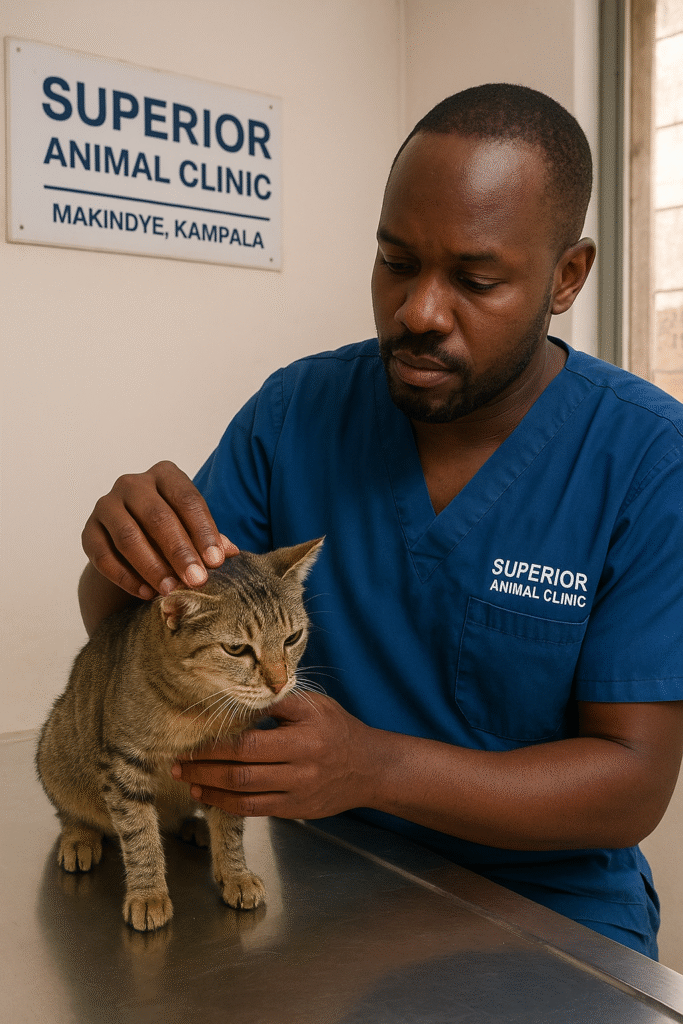
Cat breeds and ages more prone to getting cancer in Uganda
While cancer can affect any cat, patterns we observe include:
- Older cats (7+ years) have higher risk — so senior cat check-ups are key.
- Pure-bred or pedigree cats may carry genetic risk (though mixed breed cats also get cancer).
- Outdoor-active cats (roaming in suburbs, alleyways, etc) may have higher exposure to viruses/injuries.
- Female cats not spayed at a younger age are more likely to develop mammary gland cancer.
Areas in Kampala & Uganda where cat-cancer issues are common (and why)
In congested urban areas such as Old Kampala, Katwe, Lungujja, Nsambya, cats may roam, face injuries, viruses, stress. Suburbs like Bugolobi, Naguru, Muyenga, Kololo have many indoor-outdoor cats; lifestyle and sun exposure matter. Even in peri-urban zones like Bulindo, Kabojja, Lubowa, Mutundwe, cat owners may delay vet visits because clinic access is less convenient.
That’s why our clinic in Makindye (Salaama Road) positions itself centrally and says: “If you’re in Ntinda, Nakasero, Rubaga, Ndejje, Seguku or Bukoto — come to us, we’ll treat your cat cancer”.
🐱 FAQs About Cat Cancer in Uganda
1. How do I know if my cat has cancer in Uganda?
If your cat in Kampala has lumps, weight loss, bleeding, poor appetite, or unusual behavior, it could be a sign of cancer. At Superior Animal Clinic in Makindye, our vets perform blood tests, X-rays, and biopsies to confirm and diagnose cat cancer early — giving your pet the best chance at recovery.
2. What are the most common types of cat cancer in Uganda?
The most common cat cancers seen in Kampala and surrounding areas like Muyenga, Lubowa, Ntinda, and Nakasero include:
- Lymphoma (affects lymph nodes and organs)
- Mammary gland tumors (common in unspayed female cats)
- Skin cancer (Squamous cell carcinoma) – from sun exposure
- Oral cancer (mouth tumors)
- Liver and kidney cancers
Our team at Superior Animal Clinic provides accurate diagnosis and targeted treatment for all these types.
3. What causes cat cancer in Uganda?
Cat cancer may be caused by viral infections (like FeLV or FIV), toxins, poor diet, pollution, genetic factors, or excessive sunlight exposure — especially in outdoor cats. In Kampala neighborhoods like Nsambya, Kasubi, Katwe, and Rubaga, environmental exposure plays a big role. Regular vet checkups at Superior Animal Clinic, Makindye can help detect early signs before it’s too late.
4. How can I prevent cat cancer in Uganda?
To prevent cat cancer:
- Spay or neuter your cats early.
- Keep them indoors to limit sunlight and pollution exposure.
- Feed a balanced diet with high-quality protein.
- Avoid household toxins and smoke.
- Schedule routine checkups at Superior Animal Clinic — early detection saves lives.
5. Is cat cancer painful to cats in Uganda?
Yes. Cat cancer can be painful, especially when it spreads or affects internal organs. Signs include crying, hiding, poor appetite, limping, or avoiding touch. At Superior Animal Clinic in Kampala, we offer pain management, gentle therapies, and palliative care to keep your cat comfortable during treatment.
6. What is the cost of cat chemotherapy in Uganda?
At Superior Animal Clinic in Makindye, cat chemotherapy in Uganda typically costs between UGX 250,000 – 600,000 per session, depending on the type of cancer, number of sessions, and medication used. We use safe and modern chemotherapy protocols that minimize side effects while ensuring your cat’s comfort and quality of life.
7. Where can I get the best cat chemotherapy in Kampala, Uganda?
The best veterinary hospital for cat chemotherapy in Kampala is Superior Animal Clinic, located along Salaama Road, Makindye. Our experienced veterinarians use modern diagnostic tools, personalized chemotherapy plans, and safe monitoring to ensure your cat receives world-class cancer care.
8. What are the side effects of chemotherapy in cats?
Common side effects include mild vomiting, temporary loss of appetite, or slight hair thinning. Most cats tolerate chemotherapy well at Superior Animal Clinic because we use gentle, cat-specific dosages and nutritional support throughout the treatment.
9. Which cat breeds are more prone to cancer in Uganda?
Breeds like Siamese, Persian, and Maine Coons have a slightly higher risk of developing certain cancers. However, any cat, including local Ugandan cats, can get cancer — especially as they age or remain unspayed. Regular screening at Superior Animal Clinic can help catch it early.
10. At what age do cats commonly get cancer in Uganda?
Cancer is most common in middle-aged and older cats (7 years and above), but younger cats can also be affected, especially if they have genetic or viral factors. It’s important for cat owners in Ntinda, Buziga, Munyonyo, and Mutundwe to start annual vet checks once their cats turn 5 years old.
11. What happens if cat cancer is not treated in Uganda?
If left untreated, cancer in cats spreads quickly to organs like the liver, lungs, and brain — leading to pain, weakness, and eventual death. Early treatment at Superior Animal Clinic, Makindye, gives your cat the best chance to live longer and healthier.
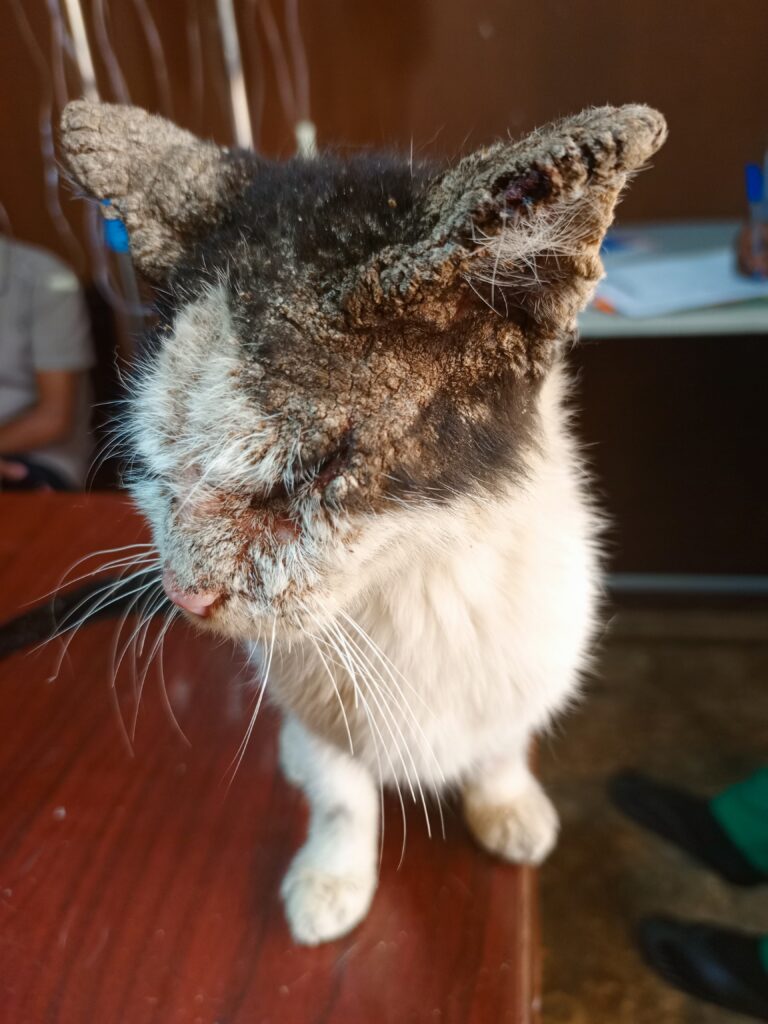
12. Are there any natural herbs in Uganda that can help cats with cancer?
Some local herbs like turmeric (for inflammation) and Moringa (immune support) may help support recovery, but they cannot replace chemotherapy or surgery. Always consult Superior Animal Clinic before giving your cat any herbs to avoid toxicity or drug interactions.
13. Why is Superior Animal Clinic the best veterinary hospital for cat cancer treatment in Kampala, Uganda?
Because we combine modern veterinary medicine with compassionate care. At Superior Animal Clinic in Makindye, our cat cancer services include:
- Accurate diagnosis (blood tests, X-rays, ultrasound, biopsy)
- Safe chemotherapy and surgery
- Pain and nutrition management
- Follow-up and emotional support for cat owners
Our mission is to help your cat live longer, happier, and pain-free — no matter the diagnosis.
14. Do you offer home-based cancer care for cats in Kampala?
Yes, Superior Animal Clinic offers home visits for cats in areas like Muyenga, Lubowa, Ntinda, and Kololo, where we can monitor progress, give medications, and ensure comfort between clinic visits.
15. Can cat cancer spread to other cats in Uganda?
No — cancer itself doesn’t spread from cat to cat. However, viral infections like FeLV or FIV, which increase cancer risk, can spread. Vaccinating and testing cats regularly at Superior Animal Clinic helps prevent this.
Final word
Dear cat-parent in Kampala: you may have worriedly searched for “cat cancer vet Kampala”, “veterinarian for cat tumour Kampala”, or “cat hospital Makindye for cancer” — we want to reassure you: you don’t have to face this alone. At Superior Animal Clinic, we stand ready to help your cat through diagnosis, treatment and monitoring.
Don’t wait. If your cat has a suspicious lump, changes in behaviour or health, book your appointment now. Early intervention could make all the difference.
📞 Call or WhatsApp us at 0771 909946
📍 Visit us at Salaama Road, Makindye, Kampala
We look forward to helping you and your beloved feline friend.
This article is for informational purposes and does not replace veterinary consultation. Please consult with our veterinary team for accurate diagnosis and treatment tailored to your cat.
